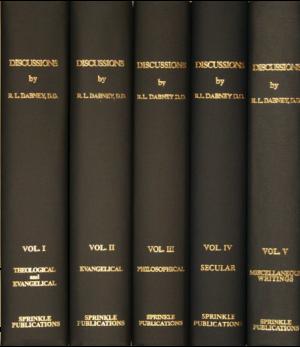
The great Southern Presbyterian theologian Robert Lewis Dabney has been mentioned a number of times on this site. It is a very telling indication of our times that such a visionary man is so little known, and usually slandered when mentioned at all. You can find the entire collection of his written works at the Dabney Archive, all of which are well worth reading. However, such a massive undertaking can be a bit overwhelming, and so on Sundays I have begun posting bite-sized excerpts from Dabney’s works with perhaps a little bit of my own commentary. This will be done in hopes of promoting wider readership for this great man. You can find links to all the previous “Dabney on Sunday” posts at the bottom of this post.
The following excerpt is taken from an article Dabney wrote for the Homiletic Review, published in January 1896 and entitled “The Influence of False Philosophies Upon Character and Conduct.”
Now, I believe there is an infallible revelation. . . . All human history and God’s Word testify, moreover, that the dominancy of these moral principles is the supreme end for which the universe exists, and for which Providence rules (read Butler’s “Analogy”). The rule of God’s final judgment is to be: everlasting good to the righteous, condemnation to the wicked. Here then is a criterion, as firmly established as the foundations of human reason and the pillars of God’s throne. He who discards this criterion makes man a reasonless brute, and the world an atheistic chaos; that man has no longer any right to any philosophy, any more than a pig. For has he not discarded the essential conditions of all philosophy, intuitive reasons in man, and rational order in the series of causes and effects? We may, therefore, safely adopt this criterion as a touchstone for every philosophy — that if it unsettles conscience and God, it is erroneous.
I have now brought my reader to the eminent point of view from which he sees that the real tendency of all false philosophy must, in the end, be against good morals and religion. Lord Bacon has nobly said that all the lines of true philosophy converge upward to God. The ethical criterion, which is the final, supreme rule of God, mankind, and the universe, must be the apex of a true philosophy. The philosophic lines which curve aside from God and right morals must therefore, in the end, pervert character and conduct. . . .
Our opponents say that they can discard these old-fashioned restraints of theologic superstitions, and apply better and more refined cheeks upon the coarser vices, viz., by showing men that the refined pleasures of temperance, aesthetic tastes, culture, and altruism are higher and sweeter than the coarse pleasures of vice; and that the two classes are incompatible, so that the lower should be sacrificed for the higher. Yes; the world has known of that subterfuge from the days of Epicurus; and knows its worthlessness. Here is the fatal reply; and its logic is plain enough to be grasped by the coarsest: “porcus de grege. Epicuri cute bene curata.” Refined Mr. Epicurus, it depends entirely upon each man’s natural constitutional tastes which class of pleasures shall be to him highest and sweetest. You say that to you music, art, letters are such; you were born so. I am so born that these are but “caviare” to me, while my best pleasures are gluttony, drink, lust, gambling, and prize-fights. The philosopher is answered.
Previous Dabney on Sundays:
Universal Suffrage
Abstractions
Redefining Terms
| Tweet |
|
|
|




